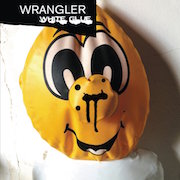The 2014 release of Wrangler’s debut album LA Spark was something of an event. The record was widely praised for its analogue warmth and for the equal amounts of groove and paranoia it held, which Q summed up as “music you can dance to while looking over your shoulder.” And, though Wrangler was all of that, for many a reviewer the trio was essentially nothing more than the long awaited new project by Cabaret Voltaire’s Stephen Mallinder: this was the event. The music was compared to the dark and innovative electro that was mid-to-late-80s Cabs, resulting in tacit affectations to a kind of “comeback” being made continuously.
The story suggested that Mallinder had supposedly disappeared from this earth, when he had in fact been living in Australia for a number of years, running a radio show and a record label, as well as producing dub tracks as Ku Ling Bros. With LA Spark, he returned to the surface, or at least to England, to join an already existing group consisting of Tunng’s Phil Winter and Ben Edwards, and Benge, owner of MemeTune studios. The band’s original concept, before Mallinder joined, was to take the approach developed by Benge for his 2008 release 20 Systems: a simple formula – one synthesizer equals one song. It ended up with a record of arpeggiated synth tones, distorted vocals and machine beats that sat well with the midnight cruising feel which characterises those night-drive scenes in certain Hollywood movies and the hordes of John Carpenter emulating bedroom producers on Bandcamp. Needless to say that LA Spark by far superseded most of these both in style and textural detail.
Edwards’ studio, basically a large collection of electronic music making machines, mainly analogue synthesizers, was and still is the place where the band jams, wrangles and records. And though they have given up on their dogmatic minimalist principle, they are still eager to practice constraint. The other major principal is collaboration. Accordingly, all of them, especially Mallinder, have stressed that their music is about the process. This is one thing Wrangler seemingly can’t emphasise enough: that they do not do electro-pop, which would imply a finished, vocal-centric sound. On the other hand side, the overall vibe of their music suggests that they’re more after arse-wiggling than synthesiser fetishising.
Wrangler’s new album, White Glue, takes up the ideas of the simple and the collaborative but aims to steer even closer to the edge of the dance floor. This means adding funky bass lines to a lot of the songs that would otherwise gurgle along, as well as including guitar riffs exactly once, on the undeniable album-highlight. This slow-grooving monster, appropriately named ‘Dirty’, has it all: a ‘bad’ 90s electro bass line, sparse but constantly mutating synth loops, Mallinder’s outbursts verging on pain. And it’s the only track on the album openly admitting to having used real drum sounds, where the remaining beats are synthetic and sound curiously malnourished. This isn’t at all discernible on ‘Stop’, a track which hears Mallinder hissing, “You can’t work out what it is that you need / so stop spending money you don’t have” over an infatuating house sound and encouraging hand claps. For a while, one feels transported right into the heart of the cosmic disco’s pulsating centre. However, the momentum is broken when ‘Real Life”s 7 minutes of robo-techno trade restraint with redundancy, and it’s such a shame following the record’s most ecstatic moments.
The question that poses itself then, is whether White Glue is meant to be only about these moments. Wrangler are very good at creating and composing sound-tapestries: the production is flawless, these old synthesizers truly sounding like they’ve probably never sounded before. The bass line in ‘Superset’ is so thick, it has so much thump to it, that it replaces any need for a harder kick drum whilst also managing to sound like pure evil recalling that familiar glorious state of paranoid dancing.
But more importantly, Wrangler seem to be pretty good at walking on the edge of the volcano, never committing themselves fully to the body or the mind, the heart or the head. It seems like they’re trying to have the best of both worlds, and it doesn’t always quite work out. For every good song, there’s one like ‘Clockwork’ that drifts into a kitsch version of the uncanny, using the dreadful keyboard choir sound that has been appropriated by the likes of James Ferraro and Dean Blunt to mixed effects.
At times, like in ‘Stupid’ or ‘Stop’, Mallinder’s vocals are intelligible, even relatable. Other times they are distorted. Somehow, they don’t seem to submerge; they linger on top of the mix. Again, it feels indecisive. Wrangler sounds neither like a Mallinder solo project (which of course they don’t want to be) nor like your average electronic jam band (which they are pretending to not want to be either). If White Glue is a dance album, it only succeeds half of the time. If it is something else, it is not clear what exactly.


